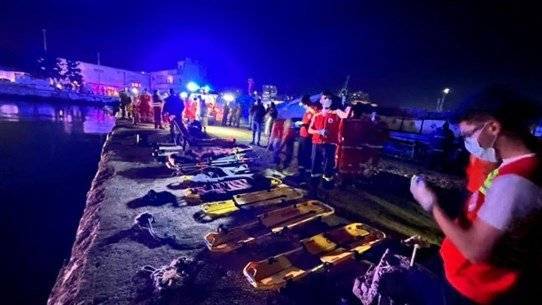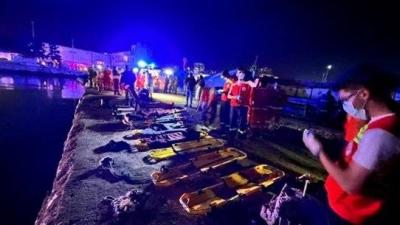It is not easy to schedule an appointment with Bariah Safwan. Her daily life is packed with work, caring for her family, doctor appointments, and "continuing the struggle to retrieve the bodies of her two daughters from the sunken death boat off Tripoli." She arrives at her home, located on the rooftop of an old building in the port, with great effort. Multiple times a day, she uses the exhausting long stairs. She cannot change the modest, cramped apartment where she has lived for 15 years. Recently, the landlord raised the rent to one million lira, which exceeds her entire salary. Previously, the rent was manageable for the family consisting of two young men and two young women who all had to work early to support themselves after their father fell ill until his death nearly ten years ago.
Since her childhood, Bariah (49 years old) has been accustomed to the "hard life" that forced her to convince her children that the sea was their last refuge. So, she threw herself along with them and her daughter's fiancé, Naji Al-Fawal, onto the boat that sank on April 23rd off Tripoli. With heartbreak and some regret, she looks at a photo of her daughters, Salam Al-Jundi (31 years old) and her sister Ghali (26 years old), displayed on the table in the center of the house. It is the last remaining image for her after her mobile phone, which was in her pocket when she drowned, broke down. Despite the cost of repairing it, Bariah visited several shops hoping to recover the photos and voice messages of her daughters. The survivor of the death boat did not care about the potential costs of filing a complaint against the Lebanese army for causing the sinking of the boat. She, as well as her sons Mustafa and Ibrahim and her son-in-law Naji Al-Fawal, were the first survivors and families of the victims who moved towards the judiciary. Many of their colleagues did not dare confront the state. But for Bariah, "I have nothing left to lose. I lost my daughters, so what am I afraid of?" However, the plaintiffs waited two full months before filing the complaint. "We waited for the state's movement to retrieve our loved ones and to announce the results of the investigations that the Military Intelligence Directorate claimed it was conducting with the soldiers who were on the boats that pursued our boat and struck it three times until it sank."
What is the regret?
As if on a confession chair, Bariah recalls the ordeal without being asked. A mother's heart will not allow her to forget. Likewise, her balcony overlooks the port of Tripoli and its islands. "My son Mustafa did not want to travel this way, although here he only has a stall. My daughter Salam and I were scared. But when we boarded the boat and saw that most of the companions on the journey were children and women, we calmed down and said our lives are not more precious than those of these children," she recounted. It pains her to have survived while her daughters were trapped in the boat that sank at a depth of 470 meters. Nothing makes her feel more regret than this. "How can I regret throwing my family into the sea after we suffocated here? My daughter Ghali's bridal trousseau, kept in the 'takhita' since she got engaged to Naji six years ago, has been ruined by moisture. She agreed to travel with us because she would get to wear the white dress in Europe."
Naji (30 years old) also has not had anything to lose for years. This death trip was not his first attempt to reach Europe illegally. More than a year ago, the pastry maker followed in the footsteps of his brother who successfully reached Germany and became a refugee. From Turkey, he entered Greece on foot, then moved through several countries until he found someone to accept his asylum. Despite his increased chances, he returned to Lebanon to bring his fiancée Ghali. Instead of subjecting her to the anguish of the long trek, he preferred to shorten the distance by sea. Al-Fawal confirms that "a number of trips left from the northern shores before and after the boat sank and safely arrived, encouraging many to try." The idea of the sea has not left his mind, similar to Bariah. "We just postponed the step until we achieve justice for Salam and Ghali and the dozens trapped in the boat."
Easing Procedures?
Illegal sea travel has ceased to be a secret in Tripoli. The incident of the boat did not deter adventurers; rather it increased their enthusiasm, "especially with the army and security forces easing their strict measures, absorbing public anger against them after being accused of causing the sinking," as rumored. At the book fair at the Cultural Association in Tripoli, one person loudly introduces another visitor as "a person who has made many illegal attempts to catch up with his wife and children in Britain." On his personal phone, Hamza does not hesitate to post statements about his dream of illegal migration. The youth, who spends his idle time fishing, has not stopped waiting for the right opportunity for a guaranteed sea trip.
In Bab Al-Hadid, a group of young men gathers at a café to take a break from the sun before continuing their wanderings in the secondhand market by the Abu Ali River. Their conversation focuses on the preparations they and their relatives have made for traveling illegally to Europe. Mamoun (42 years old) is still selling his possessions, which include modest home furniture and a quantity of used shoes. The father of three children has not yet been able to collect the amount required by smuggling networks. His sister preceded him in selling her possessions and securing the amount. Before them, his cousin's daughter and her family resorted to the sea to Germany. Bilal, the café owner, is also preparing. "I have two wives and six children. I rented the café with my brothers, opposite the secondhand stalls where customers used to rest by the dozens at our place daily. After the crisis, even the secondhand market lost its customers. Who can afford to sit in a café to buy a bottle of water for 7,000 lira?"
Ahmad Al-Samak speaks of his missing relative Muhammad, a cleaner who died in the boat with his two wives while only one of his children survived, "living with his grandmother, and still seeing nightmares in his sleep." Nevertheless, Ahmad, the daily worker at a stall in the secondhand market, does not blame those who throw themselves into the sea. Those obsessed with the dream of Europe disregard any criticism of turning to the sea despite the risk of death. Mamoun invites us to visit neighboring Bab Al-Tabbaneh, where the Al-Samak family lives, and to Al-Qobbeh, where the Al-Dandashi family resides (two families from which many perished in the incident) "so you can have a million reasons to repeat the experience, from the increase in thefts to bread queues."
Judicial Council and Submersible Stalled
Two weeks after the boat sank off the shores of Tripoli, Army Commander Joseph Aoun announced that "an investigation has begun with the soldiers who were on the army boat that collided with the boat of the illegal migrants in an attempt to stop it." So far, after two months, no results of the investigations have been announced, nor have any measures been taken based on them. Remarkably, the exact number of victims and survivors has not yet been confirmed, currently standing at 84 people, of whom 45 were rescued and seven bodies were found.
To prevent the case from being forgotten, both Bariah Safwan and her son-in-law Naji Al-Fawal sought help from the "Lana" party in Tripoli to assist them in filing a complaint. They were referred to lawyers Diala Shahada and Mohammad Sablouh, who along with them gathered a front of nine volunteer lawyers to represent them. In a conversation with "Al-Akhbar," Shahada noted that "we submitted the complaint to the Public Prosecution and asked it to oversee the investigations conducted by the army under the supervision of the military public prosecutor, particularly since no requests have yet been made to hear testimonials from survivors and the families of the victims. However, contrary to our wishes, the Public Prosecution referred the complaint to the military judiciary, which obscures the personal rights of the plaintiffs, prompting us to send a letter to the Ministry of Justice to request that the government refer the case to the Judicial Council."
The indictment included 13 army personnel on charges of "manslaughter and intentional killing through the probable intention that resulted from striking the boat three times leading to its sinking." Shahada does not express optimism about the course of the case after it was referred to the military judiciary. "Legally, it will be unjust to the plaintiffs, in addition to the delays in announcing the results of investigations, which followed the delay in the movement to rescue survivors." One of the wonders of the case is that "we cannot obtain any information regarding the investigations. We get our information from the media."
Submersible to Retrieve the Boat
The course of the lawsuit runs parallel to efforts to bring a submersible to retrieve the boat and the victims trapped in it. MP Ashraf Rifi announced about a month ago that a group of expatriates from Tripoli in Australia donated the costs of renting the submersible and its mission. According to Rifi, "the submersible will depart from the port of Tenerife Island, the largest of the Canary Islands, on June 13, and arrive in Lebanon on July 6." What has become of it?
"Al-Akhbar" contacted the AUSRELEIEF organization, which donated the costs, made up of a gathering of the sons of Al-Minya and Tripoli in Australia. However, one of the organization's activists, Ahmad Al-Ayoubi, who confirmed that the organization "is responsible for the operation," refused in a call with "Al-Akhbar" to provide detailed information about the mission of the submersible. He merely said, "When we have the date of its arrival in Lebanon, we will inform the families of the victims." While he refrained from explaining the reasons for the delay in its arrival, Al-Ayoubi denied that the Lebanese state was the cause.
In this context, Shahada argued that the state is responsible for the delay in the arrival of the submersible, "which should have retrieved the bodies," noting that the retrieval of the boat will be a turning point in the case after a technical examination to determine the impacts it received that led to its sinking. Among the evidence collected by the group of lawyers is that the number of missing persons increased as women and children resorted to the cabin of the boat after the waves flooded its exposed sections due to the army's pursuit, and then they remained trapped in the cabin after the boat sank a few minutes later.




